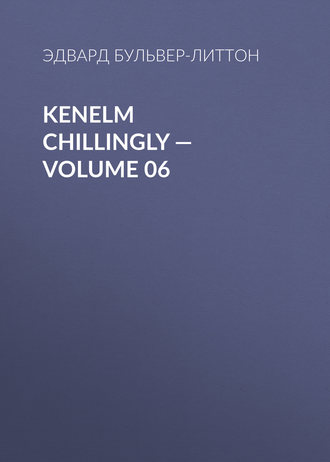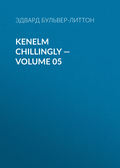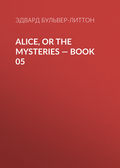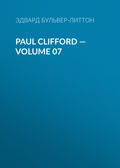
Эдвард Бульвер-Литтон
Kenelm Chillingly — Volume 06
CHAPTER XIII
THE room is duly obscured and the white sheet attached to the wall; the children are seated, hushed, and awe-stricken. And Kenelm is placed next to Lily.
The tritest things in our mortal experience are among the most mysterious. There is more mystery in the growth of a blade of grass than there is in the wizard's mirror or the feats of a spirit medium. Most of us have known the attraction that draws one human being to another, and makes it so exquisite a happiness to sit quiet and mute by another's side; which stills for the moment the busiest thoughts in our brain, the most turbulent desires in our heart, and renders us but conscious of a present ineffable bliss. Most of us have known that. But who has ever been satisfied with any metaphysical account of its why or wherefore? We can but say it is love, and love at that earlier section of its history which has not yet escaped from romance; but by what process that other person has become singled out of the whole universe to attain such special power over one is a problem that, though many have attempted to solve it, has never attained to solution. In the dim light of the room Kenelm could only distinguish the outlines of Lily's delicate face, but at each new surprise in the show, the face intuitively turned to his, and once, when the terrible image of a sheeted ghost, pursuing a guilty man, passed along the wall, she drew closer to him in her childish fright, and by an involuntary innocent movement laid her hand on his. He detained it tenderly, but, alas! it was withdrawn the next moment; the ghost was succeeded by a couple of dancing dogs. And Lily's ready laugh—partly at the dogs, partly at her own previous alarm—vexed Kenelm's ear. He wished there had been a succession of ghosts, each more appalling than the last.
The entertainment was over, and after a slight refreshment of cakes and wine-and-water the party broke up; the children visitors went away attended by servant-maids who had come for them. Mrs. Cameron and Lily were to walk home on foot.
"It is a lovely night, Mrs. Cameron," said Mr. Emlyn, "and I will attend you to your gate."
"Permit me also," said Kenelm.
"Ay," said the vicar, "it is your own way to Cromwell Lodge."
The path led them through the churchyard as the nearest approach to the brook-side. The moonbeams shimmered through the yew-trees and rested on the old tomb; playing, as it were, round the flowers which Lily's hand had that day dropped upon its stone. She was walking beside Kenelm, the elder two a few paces in front.
"How silly I was," said she, "to be so frightened at the false ghost! I don't think a real one would frighten me, at least if seen here, in this loving moonlight, and on God's ground!"
"Ghosts, were they permitted to appear except in a magic lantern, could not harm the innocent. And I wonder why the idea of their apparition should always have been associated with such phantasies of horror, especially by sinless children, who have the least reason to dread them."
"Oh, that is true," cried Lily; "but even when we are grown up there must be times in which we should so long to see a ghost, and feel what a comfort, what a joy it would be."
"I understand you. If some one very dear to us had vanished from our life; if we felt the anguish of the separation so intensely as to efface the thought that life, as you said so well, 'never dies;' well, yes, then I can conceive that the mourner would yearn to have a glimpse of the vanished one, were it but to ask the sole and only question he could desire to put, 'Art thou happy? May I hope that we shall meet again, never to part,—never?'"
Kenelm's voice trembled as he spoke, tears stood in his eyes. A melancholy—vague, unaccountable, overpowering—passed across his heart, as the shadow of some dark-winged bird passes over a quiet stream.
"You have never yet felt this?" asked Lily doubtingly, in a soft voice, full of tender pity, stopping short and looking into his face.
"I? No. I have never yet lost one whom I so loved and so yearned to see again. I was but thinking that such losses may befall us all ere we too vanish out of sight."
"Lily!" called forth Mrs. Cameron, halting at the gate of the burial-ground.
"Yes, auntie?"
"Mr. Emlyn wants to know how far you have got in 'Numa Pompilius.'
Come and answer for yourself."
"Oh, those tiresome grown-up people!" whispered Lily, petulantly, to Kenelm. "I do like Mr. Emlyn; he is one of the very best of men. But still he is grown up, and his 'Numa Pompilius' is so stupid."
"My first French lesson-book. No, it is not stupid. Read on. It has hints of the prettiest fairy tale I know, and of the fairy in especial who bewitched my fancies as a boy."
By this time they had gained the gate of the burial-ground.
"What fairy tale? what fairy?" asked Lily, speaking quickly.
"She was a fairy, though in heathen language she is called a nymph,—Egeria. She was the link between men and gods to him she loved; she belongs to the race of gods. True, she, too, may vanish, but she can never die."
"Well, Miss Lily," said the vicar, "and how far in the book I lent you,—'Numa Pompilius.'"
"Ask me this day next week."
"I will; but mind you are to translate as you go on. I must see the translation."
"Very well. I will do my best," answered Lily meekly. Lily now walked by the vicar's side, and Kenelm by Mrs. Cameron's, till they reached Grasmere.
"I will go on with you to the bridge, Mr. Chillingly," said the vicar, when the ladies had disappeared within their garden. "We had little time to look over my books, and, by the by, I hope you at least took the Juvenal."
"No, Mr. Emlyn; who can quit your house with an inclination for satire? I must come some morning and select a volume from those works which give pleasant views of life and bequeath favourable impressions of mankind. Your wife, with whom I have had an interesting conversation, upon the principles of aesthetical philosophy—"
"My wife! Charlotte! She knows nothing about aesthetical philosophy."
"She calls it by another name, but she understands it well enough to illustrate the principles by example. She tells me that labour and duty are so taken up by you—
'In den heitern Regionen
Wo die reinen Formen wohnen,'
that they become joy and beauty,—is it so?"
"I am sure that Charlotte never said anything half so poetical. But, in plain words, the days pass with me very happily. I should be ungrateful if I were not happy. Heaven has bestowed on me so many sources of love,—wife, children, books, and the calling which, when one quits one's own threshold, carries love along with it into the world beyond; a small world in itself,—only a parish,—but then my calling links it with infinity."
"I see; it is from the sources of love that you draw the supplies for happiness."
"Surely; without love one may be good, but one could scarcely be happy. No one can dream of a heaven except as the abode of love. What writer is it who says, 'How well the human heart was understood by him who first called God by the name of Father'?"
"I do not remember, but it is beautifully said. You evidently do not subscribe to the arguments in Decimus Roach's 'Approach to the Angels.'"
"Ah, Mr. Chillingly! your words teach me how lacerated a man's happiness may be if he does not keep the claws of vanity closely pared. I actually feel a keen pang when you speak to me of that eloquent panegyric on celibacy, ignorant that the only thing I ever published which I fancied was not without esteem by intellectual readers is a Reply to 'The Approach to the Angels,'—a youthful book, written in the first year of my marriage. But it obtained success: I have just revised the tenth edition of it."
"That is the book I will select from your library. You will be pleased to hear that Mr. Roach, whom I saw at Oxford a few days ago, recants his opinions, and, at the age of fifty, is about to be married; he begs me to add, 'not for his own personal satisfaction.'"
"Going to be married!—Decimus Roach! I thought my Reply would convince him at last."
"I shall look to your Reply to remove some lingering doubts in my own mind."
"Doubts in favour of celibacy?"
"Well, if not for laymen, perhaps for a priesthood."
"The most forcible part of my Reply is on that head: read it attentively. I think that, of all sections of mankind, the clergy are those to whom, not only for their own sakes, but for the sake of the community, marriage should be most commended. Why, sir," continued the vicar, warming up into oratorical enthusiasm, "are you not aware that there are no homes in England from which men who have served and adorned their country have issued forth in such prodigal numbers as those of the clergy of our Church? What other class can produce a list so crowded with eminent names as we can boast in the sons we have reared and sent forth into the world? How many statesmen, soldiers, sailors, lawyers, physicians, authors, men of science, have been the sons of us village pastors? Naturally: for with us they receive careful education; they acquire of necessity the simple tastes and disciplined habits which lead to industry and perseverance; and, for the most part, they carry with them throughout life a purer moral code, a more systematic reverence for things and thoughts religious, associated with their earliest images of affection and respect, than can be expected from the sons of laymen whose parents are wholly temporal and worldly. Sir, I maintain that this is a cogent argument, to be considered well by the nation, not only in favour of a married clergy,—for, on that score, a million of Roaches could not convert public opinion in this country,—but in favour of the Church, the Established Church, which has been so fertile a nursery of illustrious laymen; and I have often thought that one main and undetected cause of the lower tone of morality, public and private, of the greater corruption of manners, of the more prevalent scorn of religion which we see, for instance, in a country so civilized as France, is, that its clergy can train no sons to carry into the contests of earth the steadfast belief in accountability to Heaven."
"I thank you with a full heart," said Kenelm. "I shall ponder well over all that you have so earnestly said. I am already disposed to give up all lingering crotchets as to a bachelor clergy; but, as a layman, I fear that I shall never attain to the purified philanthropy of Mr. Decimus Roach, and, if ever I do marry, it will be very much for my personal satisfaction."
Mr. Emlyn laughed good-humouredly, and, as they had now reached the bridge, shook hands with Kenelm, and walked homewards, along the brook-side and through the burial-ground, with the alert step and the uplifted head of a man who has joy in life and admits of no fear in death.
CHAPTER XIV
FOR the next two weeks or so Kenelm and Lily met not indeed so often as the reader might suppose, but still frequently; five times at Mrs. Braefield's, once again at the vicarage, and twice when Kenelm had called at Grasmere; and, being invited to stay to tea at one of those visits, he stayed the whole evening. Kenelm was more and more fascinated in proportion as he saw more and more of a creature so exquisitely strange to his experience. She was to him not only a poem, but a poem in the Sibylline Books; enigmatical, perplexing conjecture, and somehow or other mysteriously blending its interest with visions of the future.
Lily was indeed an enchanting combination of opposites rarely blended into harmony. Her ignorance of much that girls know before they number half her years was so relieved by candid, innocent simplicity, so adorned by pretty fancies and sweet beliefs, and so contrasted and lit up by gleams of a knowledge that the young ladies we call well educated seldom exhibit,—knowledge derived from quick observation of external Nature, and impressionable susceptibility to its varying and subtle beauties. This knowledge had been perhaps first instilled, and subsequently nourished, by such poetry as she had not only learned by heart, but taken up as inseparable from the healthful circulation of her thoughts; not the poetry of our own day,—most young ladies know enough of that,—but selected fragments from the verse of old, most of them from poets now little read by the young of either sex, poets dear to spirits like Coleridge or Charles Lamb,—none of them, however, so dear to her as the solemn melodies of Milton. Much of such poetry she had never read in books: it had been taught her in childhood by her guardian the painter. And with all this imperfect, desultory culture, there was such dainty refinement in her every look and gesture, and such deep woman-tenderness of heart. Since Kenelm had commended "Numa Pompilius" to her study, she had taken very lovingly to that old-fashioned romance, and was fond of talking to him about Egeria as of a creature who had really existed.
But what was the effect that he,—the first man of years correspondent to her own with whom she had ever familiarly conversed,—what was the effect that Kenelm Chillingly produced on the mind and the heart of Lily?
This was, after all, the question that puzzled him the most,—not without reason: it might have puzzled the shrewdest bystander. The artless candour with which she manifested her liking to him was at variance with the ordinary character of maiden love; it seemed more the fondness of a child for a favourite brother. And it was this uncertainty that, in his own thoughts, justified Kenelm for lingering on, and believing that it was necessary to win, or at least to learn more of, her secret heart before he could venture to disclose his own. He did not flatter himself with the pleasing fear that he might be endangering her happiness; it was only his own that was risked. Then, in all those meetings, all those conversations to themselves, there had passed none of the words which commit our destiny to the will of another. If in the man's eyes love would force its way, Lily's frank, innocent gaze chilled it back again to its inward cell. Joyously as she would spring forward to meet him, there was no tell-tale blush on her cheek, no self-betraying tremor in her clear, sweet-toned voice. No; there had not yet been a moment when he could say to himself, "She loves me." Often he said to himself, "She knows not yet what love is."
In the intervals of time not passed in Lily's society, Kenelm would take long rambles with Mr. Emlyn, or saunter into Mrs. Braefield's drawing-room. For the former he conceived a more cordial sentiment of friendship than he entertained for any man of his own age,—a friendship that admitted the noble elements of admiration and respect.
Charles Emlyn was one of those characters in which the colours appear pale unless the light be brought very close to them, and then each tint seems to change into a warmer and richer one. The manner which, at first, you would call merely gentle, becomes unaffectedly genial; the mind you at first might term inert, though well-informed, you now acknowledge to be full of disciplined vigour. Emlyn was not, however, without his little amiable foibles; and it was, perhaps, these that made him lovable. He was a great believer in human goodness, and very easily imposed upon by cunning appeals to "his well-known benevolence." He was disposed to overrate the excellence of all that he once took to his heart. He thought he had the best wife in the world, the best children, the best servants, the best beehive, the best pony, and the best house-dog. His parish was the most virtuous, his church the most picturesque, his vicarage the prettiest, certainly, in the whole shire,—perhaps, in the whole kingdom. Probably it was this philosophy of optimism which contributed to lift him into the serene realm of aesthetic joy.
He was not without his dislikes as well as likings. Though a liberal Churchman towards Protestant dissenters, he cherished the /odium theologicum/ for all that savoured of Popery. Perhaps there was another cause for this besides the purely theological one. Early in life a young sister of his had been, to use his phrase, "secretly entrapped" into conversion to the Roman Catholic faith, and had since entered a convent. His affections had been deeply wounded by this loss to the range of them. Mr. Emlyn had also his little infirmities of self-esteem rather than of vanity. Though he had seen very little of any world beyond that of his parish, he piqued himself on his knowledge of human nature and of practical affairs in general. Certainly no man had read more about them, especially in the books of the ancient classics. Perhaps it was owing to this that he so little understood Lily,—a character to which the ancient classics afforded no counterpart nor clue; and perhaps it was this also that made Lily think him "so terribly grown up." Thus, despite his mild good-nature, she did not get on very well with him.
The society of this amiable scholar pleased Kenelm the more, because the scholar evidently had not the remotest idea that Kenelm's sojourn at Cromwell Lodge was influenced by the vicinity to Grasmere. Mr. Emlyn was sure that he knew human nature, and practical affairs in general, too well to suppose that the heir to a rich baronet could dream of taking for wife a girl without fortune or rank, the orphan ward of a low-born artist only just struggling into reputation; or, indeed, that a Cambridge prizeman, who had evidently read much on grave and dry subjects, and who had no less evidently seen a great deal of polished society, could find any other attraction in a very imperfectly-educated girl, who tamed butterflies and knew no more than they did of fashionable life, than Mr. Emlyn himself felt in the presence of a pretty wayward innocent child, the companion and friend of his Clemmy.
Mrs. Braefield was more discerning; but she had a good deal of tact, and did not as yet scare Kenelm away from her house by letting him see how much she had discerned. She would not even tell her husband, who, absent from the place on most mornings, was too absorbed in the cares of his own business to interest himself much in the affairs of others.
Now Elsie, being still of a romantic turn of mind, had taken it into her head that Lily Mordaunt, if not actually the princess to be found in poetic dramas whose rank was for a while kept concealed, was yet one of the higher-born daughters of the ancient race whose name she bore, and in that respect no derogatory alliance for Kenelm Chillingly. A conclusion she had arrived at from no better evidence than the well-bred appearance and manners of the aunt, and the exquisite delicacy of the niece's form and features, with the undefinable air of distinction which accompanied even her most careless and sportive moments. But Mrs. Braefield also had the wit to discover that, under the infantine ways and phantasies of this almost self-taught girl, there lay, as yet undeveloped, the elements of a beautiful womanhood. So that altogether, from the very day she first re-encountered Kenelm, Elsie's thought had been that Lily was the wife to suit him. Once conceiving that idea, her natural strength of will made her resolve on giving all facilities to carry it out silently and unobtrusively, and therefore skilfully.
"I am so glad to think," she said one day, when Kenelm had joined her walk through the pleasant shrubberies in her garden ground, "that you have made such friends with Mr. Emlyn. Though all hereabouts like him so much for his goodness, there are few who can appreciate his learning. To you it must be a surprise as well as pleasure to find, in this quiet humdrum place, a companion so clever and well-informed: it compensates for your disappointment in discovering that our brook yields such bad sport."
"Don't disparage the brook; it yields the pleasantest banks on which to lie down under old pollard oaks at noon, or over which to saunter at morn and eve. Where those charms are absent even a salmon could not please. Yes; I rejoice to have made friends with Mr. Emlyn. I have learned a great deal from him, and am often asking myself whether I shall ever make peace with my conscience by putting what I have learned into practice."
"May I ask what special branch of learning is that?"
"I scarcely know how to define it. Suppose we call it 'Worth-whileism.' Among the New Ideas which I was recommended to study as those that must govern my generation, the Not-worth-while Idea holds a very high rank; and being myself naturally of calm and equable constitution, that new idea made the basis of my philosophical system. But since I have become intimate with Charles Emlyn I think there is a great deal to be said in favour of Worth-whileism, old idea though it be. I see a man who, with very commonplace materials for interest or amusement at his command, continues to be always interested or generally amused; I ask myself why and how? And it seems to me as if the cause started from fixed beliefs which settle his relations with God and man, and that settlement he will not allow any speculations to disturb. Be those beliefs questionable or not by others, at least they are such as cannot displease a Deity, and cannot fail to be kindly and useful to fellow-mortals. Then he plants these beliefs on the soil of a happy and genial home, which tends to confirm and strengthen and call them into daily practice; and when he goes forth from home, even to the farthest verge of the circle that surrounds it, he carries with him the home influences of kindliness and use. Possibly my line of life may be drawn to the verge of a wider circle than his; but so much the better for interest and amusement, if it can be drawn from the same centre; namely, fixed beliefs daily warmed into vital action in the sunshine of a congenial home."
Mrs. Braefield listened to this speech with pleased attention, and as it came to its close, the name of Lily trembled on her tongue, for she divined that when he spoke of home Lily was in his thoughts; but she checked the impulse, and replied by a generalized platitude.
"Certainly the first thing in life is to secure a happy and congenial home. It must be a terrible trial for the best of us if we marry without love."
"Terrible, indeed, if the one loves and the other does not."
"That can scarcely be your case, Mr. Chillingly, for I am sure you could not marry where you did not love; and do not think I flatter you when I say that a man far less gifted than you can scarcely fail to be loved by the woman he wooes and wins."
Kenelm, in this respect one of the modestest of human beings, shook his head doubtingly, and was about to reply in self-disparagement, when, lifting his eyes and looking round, he halted mute and still as if rooted to the spot. They had entered the trellised circle through the roses of which he had first caught sight of the young face that had haunted him ever since.
"Ah!" he said abruptly; "I cannot stay longer here, dreaming away the work-day hours in a fairy ring. I am going to town to-day by the next train."
"Yoa are coming back?"
"Of course,—this evening. I left no address at my lodgings in London. There must be a large accumulation of letters; some, no doubt, from my father and mother. I am only going for them. Good-by.
How kindly you have listened to me!"
"Shall we fix a day next week for seeing the remains of the old Roman villa? I will ask Mrs. Cameron and her niece to be of the party."
"Any day you please," said Kenelm joyfully.







